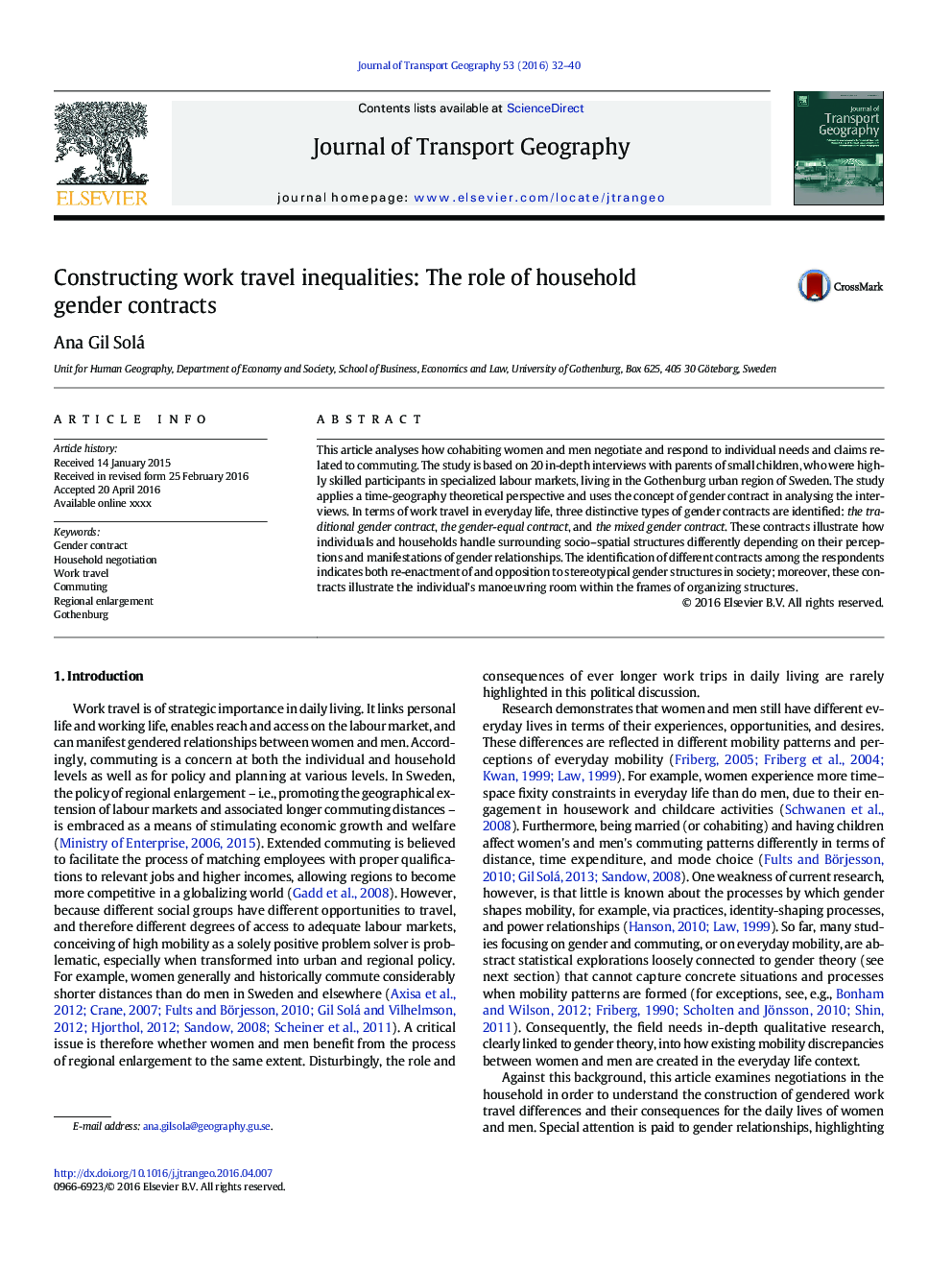| کد مقاله | کد نشریه | سال انتشار | مقاله انگلیسی | نسخه تمام متن |
|---|---|---|---|---|
| 7485402 | 1485414 | 2016 | 9 صفحه PDF | دانلود رایگان |
عنوان انگلیسی مقاله ISI
Constructing work travel inequalities: The role of household gender contracts
ترجمه فارسی عنوان
ایجاد نابرابری های سفر کار: نقش قراردادهای جنسیتی خانوار
دانلود مقاله + سفارش ترجمه
دانلود مقاله ISI انگلیسی
رایگان برای ایرانیان
کلمات کلیدی
قرارداد جنسیتی مذاکره خانگی، سفر کار مسافرت بزرگ شدن منطقه ای، گوتنبرگ،
ترجمه چکیده
این مقاله به بررسی نحوه همکاری زنان و مردان در گفتگو و پاسخگویی به نیازهای فردی و ادعاهای مربوط به رفت و آمد می پردازد. این مطالعه بر اساس 20 مصاحبه عمیق با والدین کودکان کوچک که مشارکت بسیار ماهرانه در بازار کار تخصصی داشتند، در منطقه شهری گووتنبرگ سوئد زندگی می کنند. این مطالعه چشم انداز نظری جغرافیایی زمان را مورد استفاده قرار می دهد و از مفاهیم قرارداد جنسیتی در تحلیل مصاحبه ها استفاده می کند. از لحاظ گردش کار در زندگی روزمره، سه نوع متمایز قراردادهای جنسیتی مشخص می شود: قرارداد جنسیتی سنتی، قرارداد برابری جنسیتی و قرارداد جنسیتی مخلوط. این قراردادها نشان می دهد که چگونه افراد و خانوارها بر اساس ساختارهای اجتماعی-فضایی متفاوتی رفتار می کنند بسته به ادراکات و تظاهرات روابط جنسیتی آنها. شناسایی قراردادهای مختلف در میان پاسخ دهندگان نشان می دهد هر دو مجددا اعمال و مخالفت با ساختارهای جنسیتی کلیشه در جامعه است؛ علاوه بر این، این قراردادها اتاق مانور فردی را در قالب سازه های سازماندهی نشان می دهد.
موضوعات مرتبط
علوم زیستی و بیوفناوری
علوم محیط زیست
علوم زیست محیطی (عمومی)
چکیده انگلیسی
This article analyses how cohabiting women and men negotiate and respond to individual needs and claims related to commuting. The study is based on 20 in-depth interviews with parents of small children, who were highly skilled participants in specialized labour markets, living in the Gothenburg urban region of Sweden. The study applies a time-geography theoretical perspective and uses the concept of gender contract in analysing the interviews. In terms of work travel in everyday life, three distinctive types of gender contracts are identified: the traditional gender contract, the gender-equal contract, and the mixed gender contract. These contracts illustrate how individuals and households handle surrounding socio-spatial structures differently depending on their perceptions and manifestations of gender relationships. The identification of different contracts among the respondents indicates both re-enactment of and opposition to stereotypical gender structures in society; moreover, these contracts illustrate the individual's manoeuvring room within the frames of organizing structures.
ناشر
Database: Elsevier - ScienceDirect (ساینس دایرکت)
Journal: Journal of Transport Geography - Volume 53, May 2016, Pages 32-40
Journal: Journal of Transport Geography - Volume 53, May 2016, Pages 32-40
نویسندگان
Ana Gil Solá,
